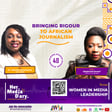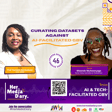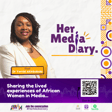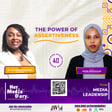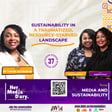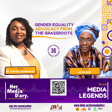
Her Media Diary Episode 24: "Honing the Craft" with Eugenia Abu
Her Media Diary Episode 24: "Honing the Craft" with Eugenia Abu
Eugenia Abu is a distinguished broadcaster, author, media consultant, and one of Nigeria’s finest broadcasters and compères renowned for anchoring the 9:00 pm news on the Nigerian Television Authority for seventeen years.
Eugenia’s advice to aspiring broadcasters is clear: focus on the craft, be patient, and always be prepared. These principles have guided her own career and will continue to inspire the next generation of media professionals.
Subscribe to Her Media Diary now on your favourite podcasting platform https://linktr.ee/hermediadiary
Learn about African Women in Media at https://africanwomeninmedia.com
List of Resources to Support Women in Media
· International Women’s Media Foundation (IWMF)
· African Women in Media (AWiM)
· Public Media Women in Leadership
· International Journalists’ network (IJNet)



